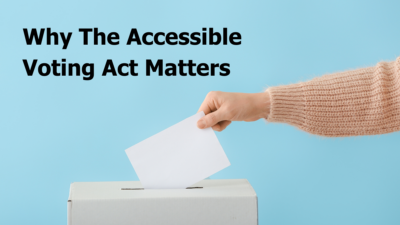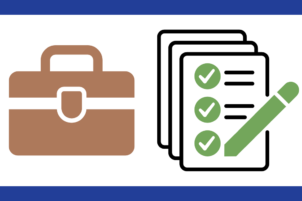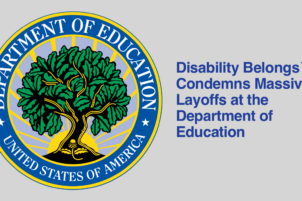 Voting should be a stress-free experience. Most people would probably agree that all aspects of voting, including registering to vote, researching the candidates and issues, and casting a ballot, should be accessible to people with disabilities. And thanks to years of effort from disability advocates, there are more accessible voting options than ever before. But unfortunately, barriers to voting persist for disabled people across America.
Voting should be a stress-free experience. Most people would probably agree that all aspects of voting, including registering to vote, researching the candidates and issues, and casting a ballot, should be accessible to people with disabilities. And thanks to years of effort from disability advocates, there are more accessible voting options than ever before. But unfortunately, barriers to voting persist for disabled people across America.
When disabled people choose to vote in-person, best practices in accessibility are often not fully utilized due to a lack of training and education. Poll workers are often not trained on how to use accessible voting devices, and some demonstrate microaggressions and implicit biases against voters with disabilities. Many disabled people are unable to drive, and for them, getting transportation to the polling place can be a challenge.
Steven McCoy, a Fellow on RespectAbility’s Entertainment and News Media team, explained that when he last voted in-person, the poll workers did not seem educated. When he explained to them that he is legally deaf-blind, instead of accommodating Steven, the poll workers yelled across the room that he was blind. This naturally made Steven feel uncomfortable. Furthermore, when he was attempting to cast his ballot, he felt as if the poll workers were trying to influence his vote.
I also have experienced many of these issues personally. As a wheelchair user with limited mobility in my hands, an accessible touchscreen voting device is useful to me when voting in-person. I can operate this system myself, which allows me the privacy that other voters have. But at my polling place, this device was unplugged, and poll workers did not know how to use it. After I finally cast my ballot, everyone clapped for me, and I felt uncomfortable and singled out. Due to this experience, I will not be voting again in-person.
Unfortunately, in many states, voting in-person can be the only option. Only about half of the States offer “no excuse” absentee voting. Absentee ballots increase accessibility for some members of the disability community. The lack of access to absentee ballots in some states, and the difficult process of getting one in others, are barriers to disabled people fully participating in civic society.
All of these challenges are why the Accessible Voting Act matters. This legislation will establish an Office of Accessibility within the Election Assistance Commission to support voters and advocates. It will establish a National Voter Accessibility website to provide information and technical assistance on voting accessibility, registering to vote, and casting a ballot. It will establish a National Resource Center on Accessible Voting that would provide cultural competency training to election officials and poll workers so stories like Steven’s don’t happen. It will provide resources to states to maintain accessible websites, address long wait times, and allow no-excuse absentee ballots. These changes put together would have a powerful impact on all voters and would encourage more disabled people to fulfill their civic duty. Learn how you can help this bill move forward in our Action Center.






